|
|
|
Sort Order |
|
|
|
Items / Page
|
|
|
|
|
|
|
| Srl | Item |
| 1 |
ID:
137229


|
|
|
|
|
| Summary/Abstract |
The anti-corruption norm in both scholarship and the policy world has too narrowly focused on the domestic and institutional context of bribe-taking and public corruption. Instead, we argue that corruption in the contemporary global economy requires a multiple set of connected transactions, processes, and relationships that take place within informal transnational networks that blur the line between illegal and legal activities. These networks include multinational companies, elites in host countries, offshore financial vehicles and conduits, middlemen and brokers, and destination financial institutions. We examine how these actors operate in Central Asia, a region that is widely identified as corrupt, yet is rarely understood as embedded in the types of global processes, offshore connections and transnational links specified in our analysis. Examples of offshore centers in tax planning from Central Asia, and partial results from a field experiment based on impersonating high corruption risks from four Central Asian states, provide evidence for how the various actors in transnational financial networks structure their dealings. We then present two brief illustrative cases of how these transnational networks have operated in energy explorations services in Kazakhstan and telecommunications contracts in Uzbekistan. Our findings have theoretical, practical, and normative implications for scholars and practitioners of Central Asian international political economy and other ‘high risk' regions.
|
|
|
|
|
|
|
|
|
|
|
|
|
|
|
|
| 2 |
ID:
100913
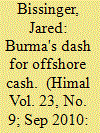

|
|
|
| 3 |
ID:
162943
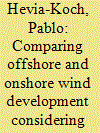

|
|
|
|
|
| Summary/Abstract |
Cost efficient deployment of wind energy is in focus for reaching ambitious targets for renewable energy and transforming the energy supply to one based on renewables. However, as more wind is being deployed the available sites onshore become less attractive in terms of wind conditions and capacity factor and more resistance from population groups affected in the deployment areas results in a reduction of areas that can be developed. We consider three different methods for estimating acceptance costs, one based on compensation and property purchase costs, one based on property value loss near wind turbines, and one based on willingness to pay calculated from a stated preference study. Utilising these methods, we provide an estimation of Levelised Cost of Energy (LCOE) for an expansion of 12 GW onshore or offshore wind capacity in Denmark. We find that the three methods provide similar estimates for local acceptance, but that a high range of uncertainty exists in the upper bound of acceptance costs. Onshore does not have a clear-cut cost advantage over offshore when considering substantial amounts of wind capacity expansion and using high estimates for nation-wide acceptance costs. Moderate onshore wind expansion considering only local acceptance has a cost advantage.
|
|
|
|
|
|
|
|
|
|
|
|
|
|
|
|
| 4 |
ID:
176832
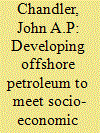

|
|
|
| 5 |
ID:
176883
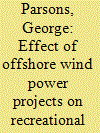

|
|
|
|
|
| Summary/Abstract |
We use contingent-behavior data from a stated-preference survey to estimate the effect of offshore wind power projects on recreational beach use on the East Coast of the United States. The data are from an internet-based probabilistic sample of beachgoers (n = 1725) visiting beaches from Massachusetts to South Carolina in 2015. The contingent-behavior data are based on responses to visual simulations of wind power projects at seven different distances offshore (2.5–20 miles) in clear and hazy conditions and at night. We consider the effect on beach enjoyment/experienceand trips taken to a beach. As expected the nearer the projects are to shore, the greater their negative effect. For example, at 2.5-miles offshore, 29% of the sample state they would not visit the beach compared to only 5% at 20-miles offshore. Offsetting the negative effects, we also find evidence of potentially a large numbers of curiosity trips to view offshore wind power projects.
|
|
|
|
|
|
|
|
|
|
|
|
|
|
|
|
| 6 |
ID:
158645


|
|
|
|
|
| Summary/Abstract |
In the Democratic Republic of Congo, donors promoted rapid liberalisation and presidential elections in the aftermath of the war, and after two terms, President Kabila has not left office. This article engages with the question of how liberalisation and elections are connected, and how they are related to the extension of presidential power. It finds that the international market for minerals has shaped the domestic political economy but its nature has effectively been ignored in the formulation of donor policy; efforts at regulating trade have been concentrated on due diligence of origin in Congo but have not addressed the secrecy of international trade. Liberalisation has removed control of economic resources from Congo, provided returns for elite politicians and funded violence to control the disenfranchised population. The offshore companies are the elephant in the room; without acknowledging them, analysis of the liberalisation and its interaction with presidential tenure lacks assessment of the opportunities, interests and power that shaped the processes.
|
|
|
|
|
|
|
|
|
|
|
|
|
|
|
|
| 7 |
ID:
137232
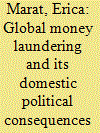

|
|
|
|
|
| Summary/Abstract |
This paper examines how Kyrgyzstan's two post-communist political regimes used offshore accounts to launder money and broker lucrative deals with international business partners. It argues that easy access to global financial institutions and availability of offshore markets strengthens a corrupt regime's grip on both political and economic matters and gives regime members a feeling of invincibility both domestically and globally. Offshore connections contributed to the emergence of a vast shadow economy inside Kyrgyzstan that includes clandestine hydropower exports, manipulations in the financial sector, and organized crime. The paper particularly focuses on the non-state actors who served as brokers to mediate connections between regime incumbents and international markets.
|
|
|
|
|
|
|
|
|
|
|
|
|
|
|
|
| 8 |
ID:
191219


|
|
|
|
|
| Summary/Abstract |
Hydrogen can be key in the energy system transition. We investigate the role of offshore hydrogen generation in a future integrated energy system. By performing energy system optimisation in a model application of the Northern-central European energy system and the North Sea offshore grid towards 2050, we find that offshore hydrogen generation may likely only play a limited role, and that offshore wind energy has higher value when sent to shore in the form of electricity. Forcing all hydrogen generation offshore would lead to increased energy system costs. Under the assumed scenario conditions, which result in deep decarbonisatiton of the energy system towards 2050, hydrogen generation – both onshore and offshore – follows solar PV generation patterns. Combined with hydrogen storage, this is the most cost-effective solution to satisfy future hydrogen demand. Overall, we find that the role of future offshore hydrogen generation should not simply be derived from minimising costs for the offshore sub-system, but by also considering the economic value that such generation would create for the whole integrated energy system. We find as a no-regret option to enable and promote the integration of offshore wind in onshore energy markets via electrical connections.
|
|
|
|
|
|
|
|
|
|
|
|
|
|
|
|
| 9 |
ID:
133009
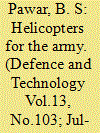

|
|
|
|
|
| Publication |
2014.
|
| Summary/Abstract |
The Aviation Corps ( AAC ) is nowhere near the one envisaged in 1963 by the then COAS Gen jN Chaudhry or as has been projected in the army's perspective plans over the years and lacks some vital elements in its inventory, related to firepower, lift and logistics capability. lt is indeed a far cry from the Aviation Corps of the other professional armies in the world like US and UK and our neighbors China and Pakistan, who operate and own all types of helicopters as well certain number of fixed wing aircraft.
|
|
|
|
|
|
|
|
|
|
|
|
|
|
|
|
| 10 |
ID:
167153
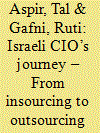

|
|
|
|
|
| Summary/Abstract |
One of the difficult decisions that a Chief of Information Manager takes is whether to use organisational resources or to contract suppliers, in order to perform information technology (IT) projects. Over the last decade, managers in Israel have moved from insourcing to outsourcing due to different reasons, mainly to reduce costs and focus on their core business. In the last two years, they started to return IT projects, services, and activities back, using new source models. This study examines the tendency of the Israeli IT managers in sourcing decisions in order to understand the problems, application and suitability of various kinds of models.
|
|
|
|
|
|
|
|
|
|
|
|
|
|
|
|
| 11 |
ID:
097493
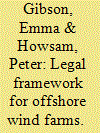

|
|
|
|
|
| Publication |
2010.
|
| Summary/Abstract |
The impact of the legal framework for the consents process on the rate of development of offshore wind farms in England, and the achievement of targets for renewable electricity generation have been reviewed. From the literature and consulted stakeholders it was found that the complexity of the current consents process has adversely affected the rate of development and the achievement of renewable energy targets. Future projects will be subject to a different legal framework for consents, under the Planning Act 2008 and the Marine and Coastal Access Bill. From a comparison of process diagrams for the current and future consents processes, it is concluded that the future process should be an improvement. However, uncertainties remain about the detailed procedures and operation of the future consenting authorities. The capacity and capability of key stakeholders to meet their obligations have implications for the time frame for the processes of applying for, and the granting of, consents. Furthermore improved engagement from developers and clarity about the role of local authorities are essential if progress is to be made. The need for a holistic and strategic view of the industry, including associated development of the supply chain and the transmission grid, is also highlighted.
|
|
|
|
|
|
|
|
|
|
|
|
|
|
|
|
| 12 |
ID:
103860


|
|
|
|
|
| Publication |
2011.
|
| Summary/Abstract |
This paper examines offshore finance centres and tax havens that are hosted by small island economies (SIEs). In many cases, hosting offshore finance has been a lucrative activity for SIEs since the 1960s in terms of employment (direct and indirect) and overall contribution to GDP and government revenues. Despite the scale and reach of the global offshore economy, at present many SIE hosts face an unsettled future in light of significant international pressure from nation states, international organisations such as the EU and OECD and, increasingly, from civil society in both the developed and less-developed world. Given the economic importance of hosting offshore finance for many SIEs around the world, the development options facing many island jurisdictions are discussed. The paper poses the fundamental question: what has changed since the major initiatives around the year 2000? Then the situation facing many SIE hosts, the changing global political economy and their shifting negotiations and alliances within it are discussed.
|
|
|
|
|
|
|
|
|
|
|
|
|
|
|
|
| 13 |
ID:
137230
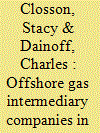

|
|
|
|
|
| Summary/Abstract |
Gazprom's utilization of offshore registration – or the moving of money across national boundaries for reasons other than of direct business benefit – has resulted in the creation of a web of subsidiary companies with opaque leadership and financial arrangements. Some of these subsidiary companies operate as intermediaries in the natural gas trade among the former Soviet states. Given that the gas trade within Eurasia has a long history of fixed contracts that move gas through a network of pipelines, why were intermediaries created, and why register them offshore? Using a critical reading of stateness as a space for transnational networks, and supported by mind-mapping software, we analysed the structure and operations of offshore gas intermediary companies between Russia and Central Asia dating from the break-up of the Soviet Union. We conclude that there were several purposes for using intermediary gas companies, from navigating trade among the newly independent states, to asset stripping, monopolizing markets, and obfuscating finance and ownership. However, the usefulness of intermediary companies to Gazprom may have expired, as a confluence of increased competition among suppliers, diversification of export routes, and economic stagnation has led to exporters and importers calling for their end.
|
|
|
|
|
|
|
|
|
|
|
|
|
|
|
|
| 14 |
ID:
166567
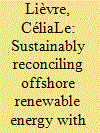

|
|
|
|
|
| Summary/Abstract |
The nascent nature of offshore renewable energy (ORE) technologies coupled with the existence of considerable data gaps and uncertainty on the receiving marine environment demands a paradigm shift in our approach to assessing and managing the impacts of the ORE sector on marine Natura 2000 sites. This paper investigates how the ecosystem-based principles of resilience and adaptive management can be best applied under the appropriate assessment process of the Habitats Directive to reconcile the increasing demand for offshore renewables and biodiversity conservation. In so doing, it challenges the strict interpretation of the precautionary principle which has been crystallised by the EU judiciary under the regime of Article 6(3) of the Habitats Directive and suggests embracing adaptive management as a better methodology to enhance the outcomes of the appropriate assessment in the face of uncertain impacts on Natura 2000 sites and their qualifying features. The aim of this study is solution-based: it seeks to improve the implementation of the assessment procedure of the Habitats Directive before it truly becomes an ‘obstacle course’ for offshore renewable energy developers.
|
|
|
|
|
|
|
|
|
|
|
|
|
|
|
|
| 15 |
ID:
089557


|
|
|
|
|
| Publication |
2009.
|
| Summary/Abstract |
We extend the model of Antràs and Helpman (Antràs, P., Helpman, E., 2004. Global Sourcing. Journal of Political Economy 112(3), 552-580) by incorporating the merits of Zhang and Markusen (Zhang, K.H., Markusen, J.R., 1999. Vertical Multinationals and Host-country Characteristics. Journal of Development Economics 59(2), 233-252.) to demonstrate why China has been so successful in disproportionately attracting foreign offshore manufacturing activities, while India has been engaged mainly in offshore service activities. We argue that the host country's industry-specific technology capabilities make the difference in FDI composition between China and India. In addition to incomplete contract frictions, the host country's technological capabilities, which affect technology transfer costs, are essential to FDI inflows. We also find that, after excluding overseas Chinese investment, India is almost on par with China in terms of the market size it offers to marketing-seeking FDI.
|
|
|
|
|
|
|
|
|
|
|
|
|
|
|
|
|
|
|
|
|